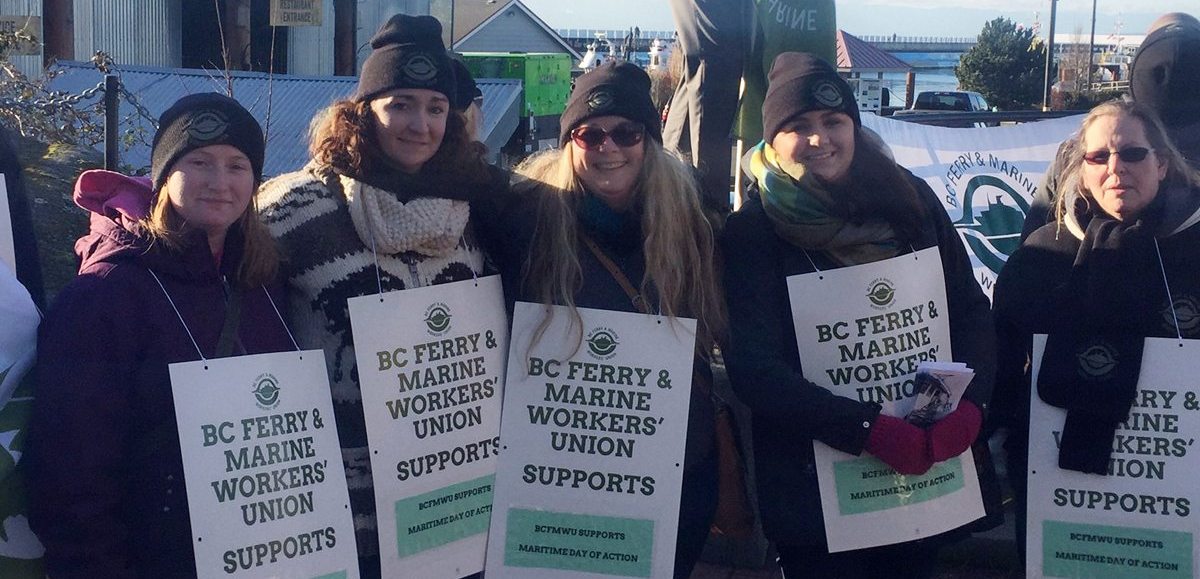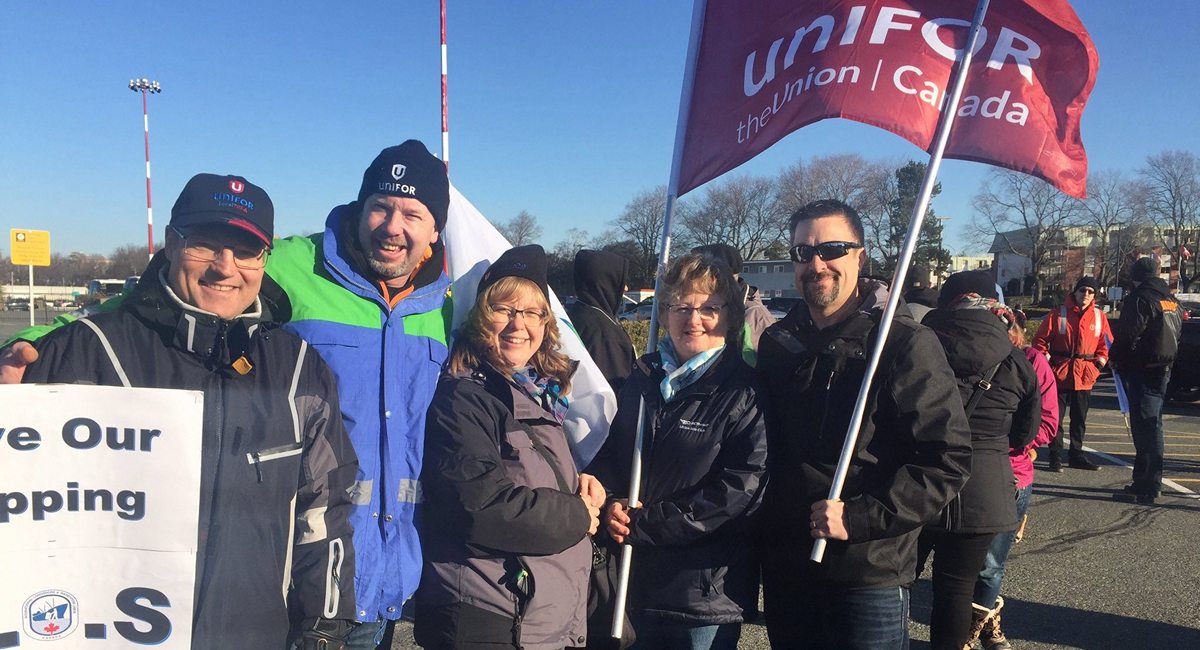Forestry Workers Confront Problems in
Their Sector
• Canada's Economy and the Softwood Lumber
Export Conundrum
Workers In Action to
Defend Their Rights
• Hamilton Steelworkers Rally to Defend Pensions
• Vigorous Day of Action to Defend
Maritime Jobs Against Neo-Liberal
Free Trade with Europe
Forestry Workers Confront Problems in
Their Sector
Canada's Economy and the Softwood Lumber
Export Conundrum
The ongoing struggle to find a new
direction for the economy that
serves
the actual producers and their communities
Forestry workers produce billions of dollars worth of
softwood lumber annually of which 88 per cent is exported mainly to the
U.S., China and Japan. The ownership and control of the industry is
concentrated in the hands of a few who mostly have no direct
connection or stake in the Canadian forestry communities except the
rate of profit on their investments.
 The reliance on export of
softwood lumber, mainly to the U.S.,
means production is subject to the recurring crises in the U.S.
housing market and the parasitism and decay of the U.S. financial
oligarchy. The current dependence on exports over which Canada's
forestry workers and communities have no control, coupled with
ownership and control that views the actual producers as "costs"
and "things" to be exploited when needed and discarded when markets are
low, present the forestry communities with a real dilemma.
How can forestry workers affirm their rights and build a life and
future for themselves, their children and communities that are
stable, secure and modern in all economic, political, cultural and
social forms?
The reliance on export of
softwood lumber, mainly to the U.S.,
means production is subject to the recurring crises in the U.S.
housing market and the parasitism and decay of the U.S. financial
oligarchy. The current dependence on exports over which Canada's
forestry workers and communities have no control, coupled with
ownership and control that views the actual producers as "costs"
and "things" to be exploited when needed and discarded when markets are
low, present the forestry communities with a real dilemma.
How can forestry workers affirm their rights and build a life and
future for themselves, their children and communities that are
stable, secure and modern in all economic, political, cultural and
social forms?
For the fifth time in recent memory a coalition of U.S.
lumber
companies is attempting to block Canadian softwood lumber
exports to the United States with the aim to raise U.S. softwood lumber
market prices. The U.S. International Trade Administration
(USITA) gave those efforts state approval on January 6, with
an initial ruling of "injury" to U.S. lumber companies from
Canada's "unfair trade practices."
When the USITA imposed anti-dumping duties and
countervailing duties of 20 or 25 per cent come into effect, probably
in March,
they will almost certainly depress Canadian production of primary and
processed or fabricated softwood product, at least in the
short term. U.S. importers of Canadian lumber will have to pay cash
deposits to the U.S. government to cover the preliminary
countervailing duties.
The USITA penalties on Canadian produced lumber will
generate an
overall increase in the market price of lumber throughout the
U.S., which may be the primary aim of the action, especially at this
time when U.S. demand is strong but supply as well is
plentiful with more and more coming from Europe. U.S. demand for
lumber,
other than in a severe downturn, is greater than U.S.
production alone can supply. Construction companies and other buyers of
lumber need the quality and quantity of Canadian, and more
recently European produced, lumber to meet their needs, but this need
does not translate into stability for Canadian forestry
communities.
 This fifth deliberate attack
on Canadian softwood
exports to the
United States together with the recurring crises in U.S.
demand raise important questions for Canadian workers and their
forestry communities. The U.S. market for Canadian lumber is not
reliable. What then can be done to make the forestry communities viable
places to live with strong diverse economies that can
withstand the recurring crises arising from disruption to softwood
lumber production? What new economic direction in the forestry
communities is necessary that serves the people, and what social force
will stand up for those communities and become a voice and
leader to build the new?
This fifth deliberate attack
on Canadian softwood
exports to the
United States together with the recurring crises in U.S.
demand raise important questions for Canadian workers and their
forestry communities. The U.S. market for Canadian lumber is not
reliable. What then can be done to make the forestry communities viable
places to live with strong diverse economies that can
withstand the recurring crises arising from disruption to softwood
lumber production? What new economic direction in the forestry
communities is necessary that serves the people, and what social force
will stand up for those communities and become a voice and
leader to build the new?
The negative consequences
from any disruption to forestry are
significant throughout Canada where Statistics Canada reports
232,700 workers are directly employed. Another 289,000 workers are
indirectly employed in the sector in such ways as engineering,
transportation, and construction, not including the support services
the communities require.
Softwood lumber exports to the U.S. fell dramatically
after the
2008 economic crisis. As a percentage of total Canadian lumber
exports, the U.S. share reached its lowest level in 2011, accounting
for only 54 per cent. China in that same year accounted for
21 per cent, but with sales to the U.S. expanding during the last five
years, the U.S. market has regained its dominance. By 2015,
the U.S. market accounted for 69 per cent of Canada's softwood lumber
exports for which the annual market value was around $5
billion.
Tens of thousands of BC forestry workers living in 140
communities produce 50 per cent of Canada's softwood lumber exports
to the United States. In order of export volume, following BC, workers
produce significant quantities in Quebec, Alberta, Ontario
and the Maritimes. Across Canada, forestry workers and their
communities are particularly vulnerable to any downturn of softwood
lumber exports or those of other forest products. The sector
dominates many local economies. Forestry workers have asked
the Workers' Centre of CPC(M-L) to assist in organizing and in
discussing the problems facing their sector and communities. As part
of this initiative Workers' Forum will regularly produce items
on their organizing work and discussions dealing with
their problems and a new direction for the economy.
The issues facing Canadian forestry communities are not
unique; they are similar to any economy where one sector dominates,
and in addition, where ownership and control are mostly concentrated
outside the community and the value produced in the main
sector, other than the claims of the working class, does not stay in
the local community to propel forward the diversity of its
economic base and guarantee the well-being, stability and security of
the people.

Forum organized in Prince George, April 12, 2014, by the Stand Up for
the North Committee to discuss how to solve problems faced by forestry
industry and communities.
For example, the social forces that own and control the
forestry
industry have used value from Canadian workers' production of
softwood lumber to expand their ownership of U.S. softwood lumber
production. Since 2004 in particular, value from Canadian
production has been used in part to purchase and expand lumber
production facilities in the United States. In ten years,
Canadian-headquartered lumber companies have gone from owning two mills
in the U.S. to 41. West Fraser now owns more mills in the
U.S. South (15) than in Canada (13) and is the fourth largest lumber
producer in the United States. Interfor owns 13 sawmills in
the U.S. -- nine in the South and four in the Northwest -- compared
with
only five sawmills in Canada, and has become the fifth
largest producer of lumber in the U.S. Canfor Corp owns 13 sawmills in
the U.S. South, one more than its Canadian total and in the
process has become the seventh largest producer of U.S. lumber. The
owners of those big companies, along with U.S.-headquartered
Weyerhaeuser, dominate Canadian softwood lumber production and will
actually see their rates of profit in their U.S. operations
rise, as U.S. market prices go up in the face of U.S.-imposed duties on
Canadian softwood lumber.
Instead of the value Canadian forestry workers produce
going
towards diversifying and strengthening their local economies to
make them more diverse and less dependent on a single industry, those
who own and control the dominant industry are ripping value
out of the Canadian forestry communities leaving them weak and
vulnerable.
Workers' Forum will expose this and other
problems to assist forestry workers and their communities to find a new
direction forward. A way forward for the forestry communities must come
from the initiative of the forestry workers themselves,
their supporters and allies, as they struggle to organize themselves
and build their independent institutions and voice. If this
is done consistently, a powerful movement to change the direction of
the economy can come into being.

Workers In Action to Defend Their Rights
Hamilton Steelworkers Rally to Defend Pensions
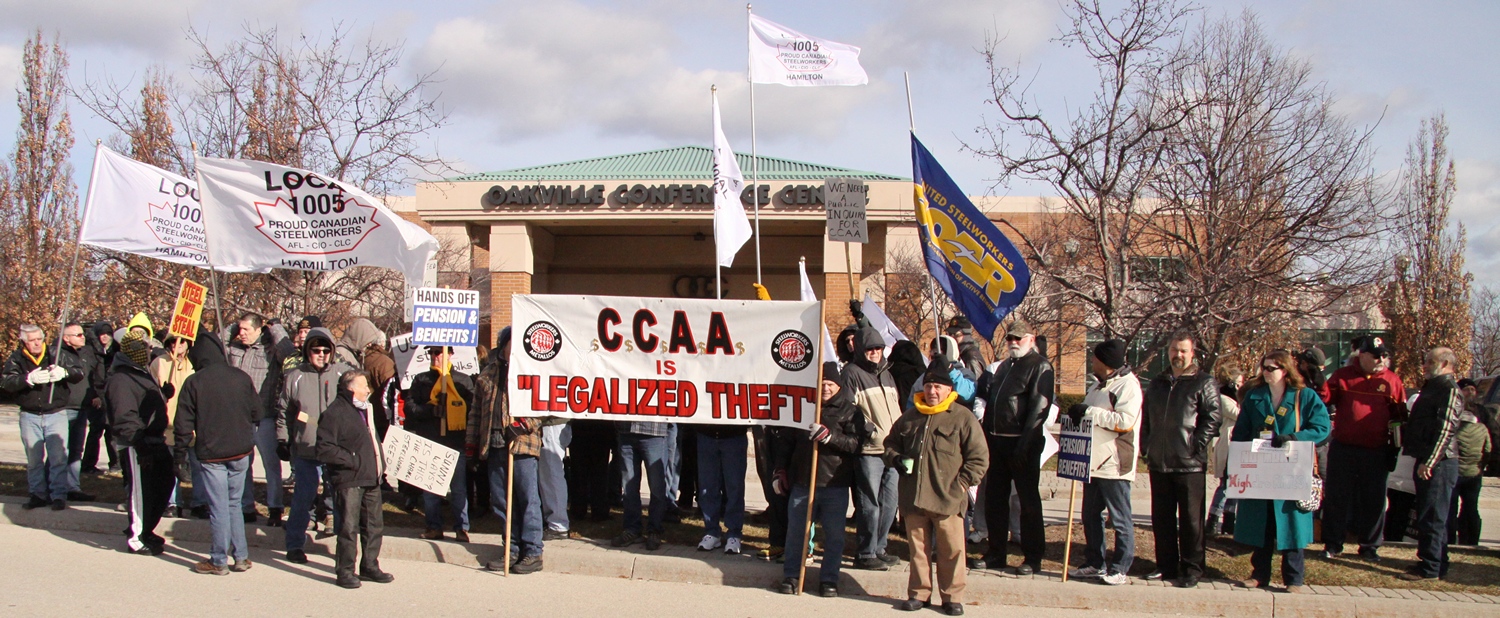
Close to 100 people staged a lively rally on January 13,
to defend their rights and express their determination to hold the
Wynne/Trudeau Liberal governments to account. Braving the cold outside
the Oakville Conference and Banquet Centre, active and
retired steelworkers from USW Local 1005 demanded the provincial Wynne
government enforce the law and ensure U.S. Steel or any
successor company make workers' pensions whole, pay other
post-employment benefits and turn Stelco back into a viable Canadian
steel producer.
USW Local 1005 has long pointed out that the federal
and provincial governments allowed U.S. Steel to seize control of
Stelco under certain
legal conditions, which it arbitrarily broke. The entire fiasco of U.S.
Steel's takeover of Stelco has not been a net benefit to
Canada, as required under federal law. The Trudeau government has the
power to hold U.S. Steel and any successor company to
account for its promises, and for the moral and legal conditions they
agreed to under the Investment
Canada Act. Nothing less than
full compliance is acceptable! Both provincial and federal Liberal
governments cannot allow U.S. Steel to run off back to the U.S.
as if it caused no harm, as if nothing has happened for which it must
be
held to account. No excuse is acceptable!
Local residents outraged at the astronomical hydro rate
increases in Ontario, and others with legitimate grievances joined
steelworkers outside the conference hall where Ontario Premier Kathleen
Wynne was the guest speaker. They carried banners,
placards and flags and greeted the arriving guests with chants
expressing their determination to defend their rights and the
rights of all.
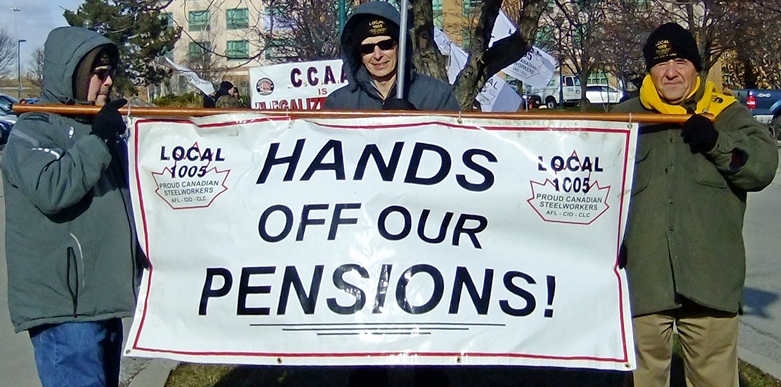

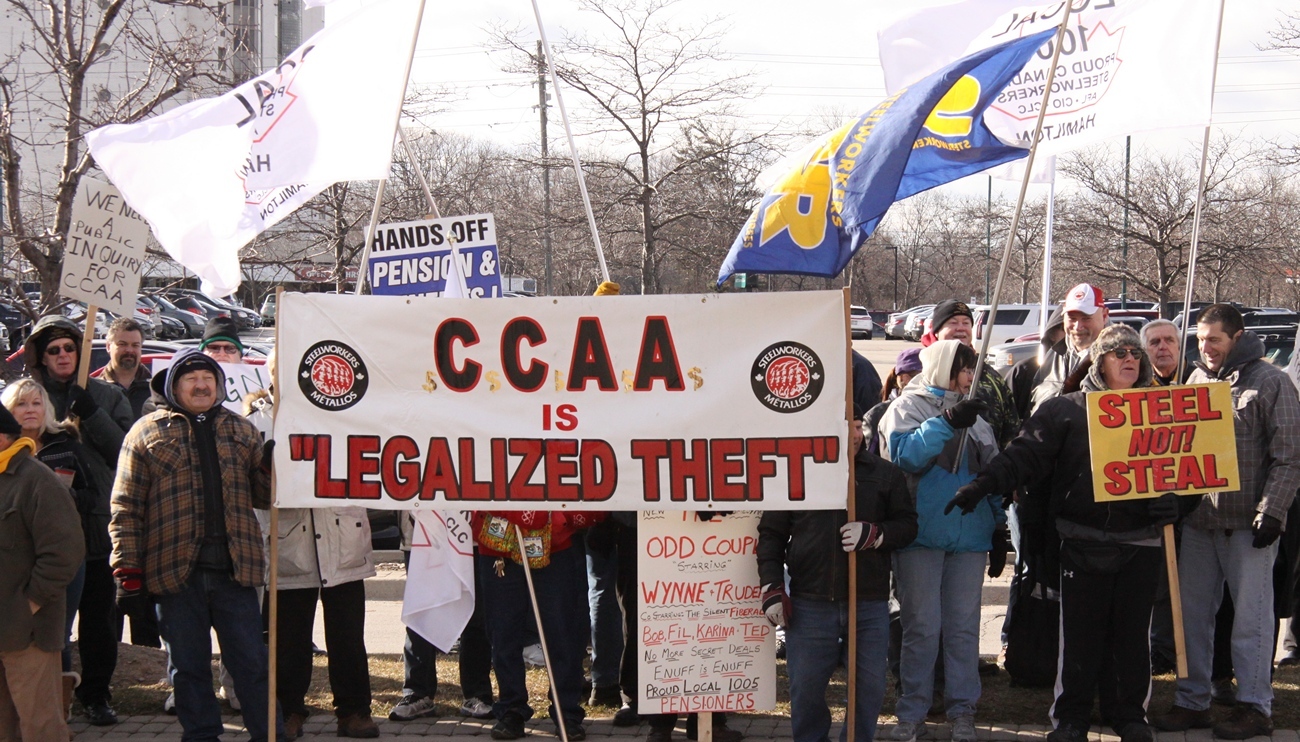
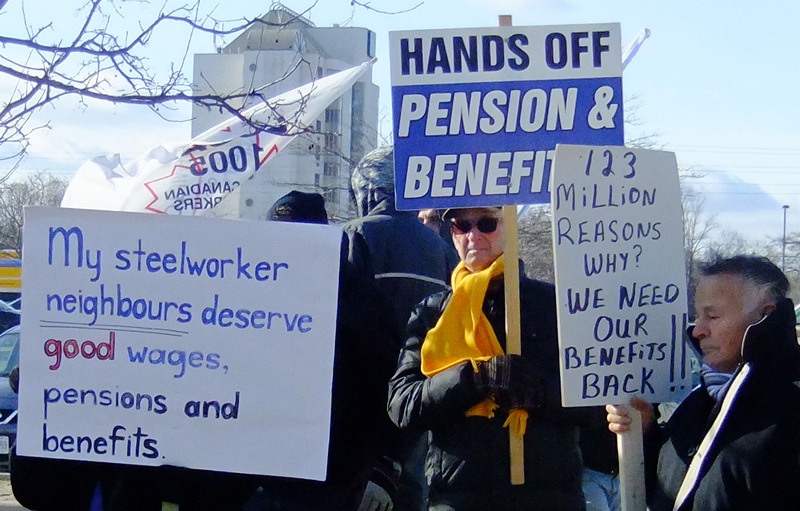
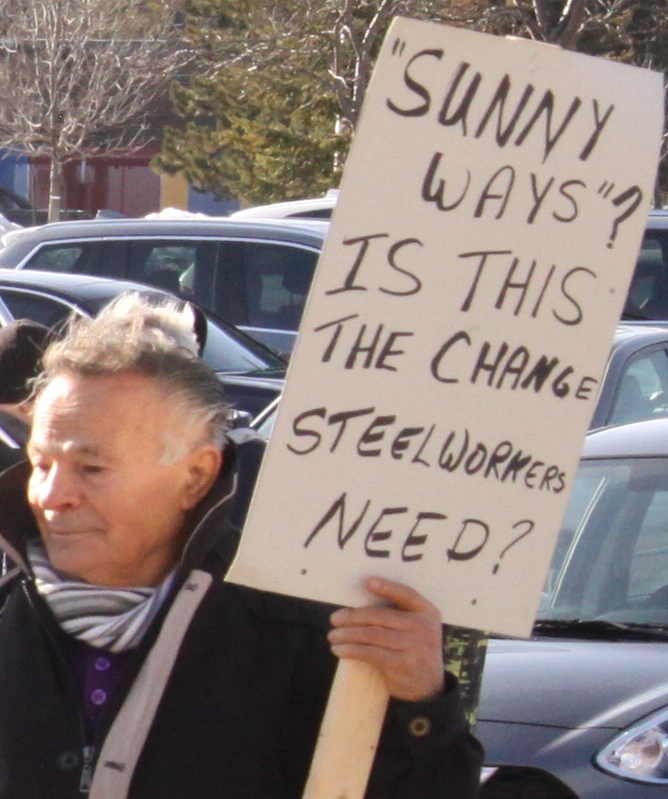
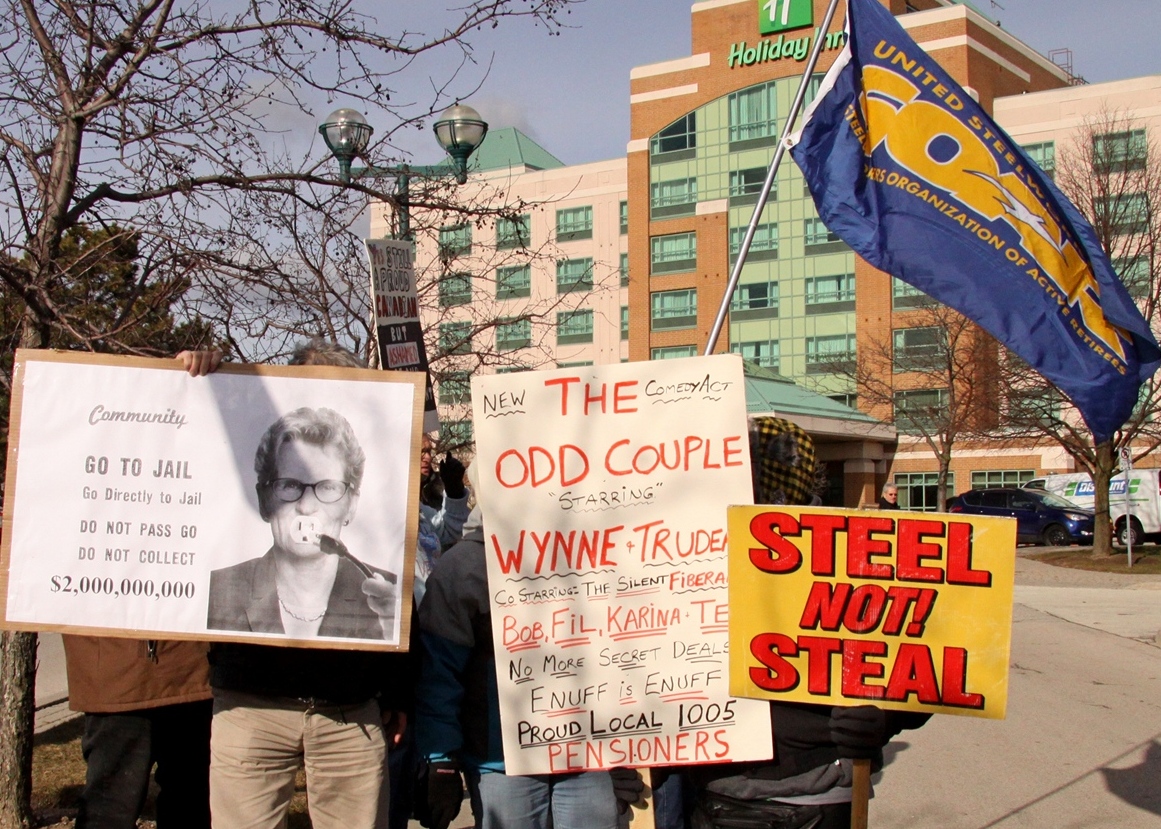
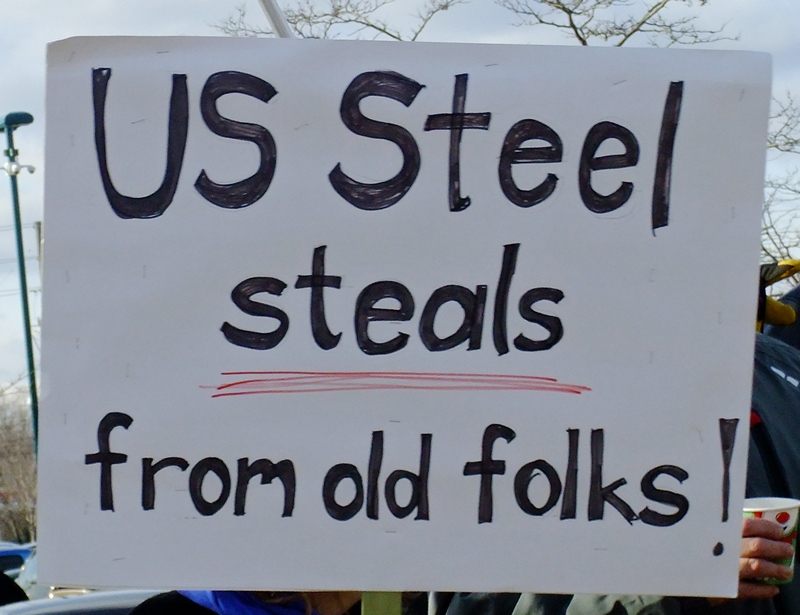

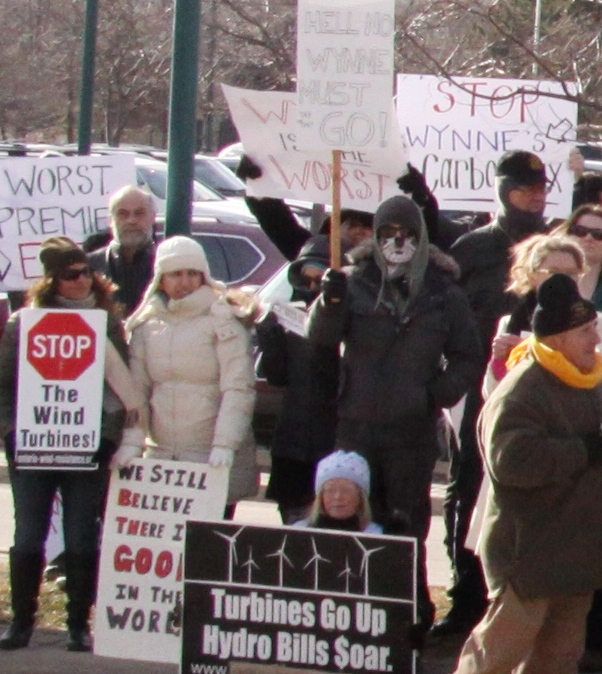



Vigorous Day of Action to Defend Maritime Jobs Against
Neo-Liberal Free Trade with Europe
On January 12, sailors, longshoremen, seaway and other
workers took part in militant demonstrations against the neo-liberal
Canada-European Union Comprehensive Economic and Trade Agreement
(CETA). Demonstrations were held in St. John's, Montreal,
Toronto, Vancouver, Victoria and Prince Rupert. In St. John's, the
action was held at the constituency office of MP Seamus
O'Regan. In Montreal, the action took place in front of the
constituency office of Transport Minister Marc Garneau. In Toronto,
workers marched to the constituency office of Foreign Affairs Minister
Chrystia Freeland (who oversaw the CETA file while
International Trade Minister). In Vancouver, workers protested at the
constituency office of Liberal MP Hedy Fry, while in
Victoria the action took place at the docks in Ogden Point, and in
Prince Rupert workers rallied at the Transport Canada office.
 The demonstrations were led
by the Seafarers International Union of Canada, the International
Longshore and Warehouse Union, the
International Longshoremen's Association, the Canadian Union of Public
Employees and Unifor.
The demonstrations were led
by the Seafarers International Union of Canada, the International
Longshore and Warehouse Union, the
International Longshoremen's Association, the Canadian Union of Public
Employees and Unifor.
"Stand Up! Fight Back!" was the rallying cry as workers
opposed attacks on their livelihoods and whole sectors of the economy
as a result of neo-liberal supranational free trade agreements. It is
estimated that more than 250,000 workers in Canada will be directly or
indirectly affected by CETA.
The demonstrators denounced CETA as a deal reached in
secret that
serves narrow private interests at the expense of the
maritime transport industry of the countries involved, the maritime
workers and workers as a whole. They demanded that the Trudeau
government defend the livelihoods of the Canadian maritime workers and
communities.
Workers denounced in particular the opening up of
cabotage rights for internal waterways to European vessels, many of
whom are
flying European "flags of convenience" with wages and working
conditions far below the accepted standards. In Montreal, a ship
inspector from the International Transport Workers' Federation spoke
about the sub-human conditions that prevail on these ships, such as
famine wages that are often withheld for months and lack of food.
Workers warned the Trudeau government not to adopt the
Canada
Transportation Act Review Report (Emerson Report) commissioned by
the Harper
government that advocates further deregulation and privatization of
transportation services and
infrastructure including ports. The report also
advocates the elimination of the cabotage rules that protect Canadian
maritime jobs.
Workers also denounced the reckless automation in the
industry based on treating workers as a "cost" that can be reduced, to
the point that global maritime companies are considering running ships
on the high seas with no crews on board, jeopardizing
public safety and the environment.
Montreal
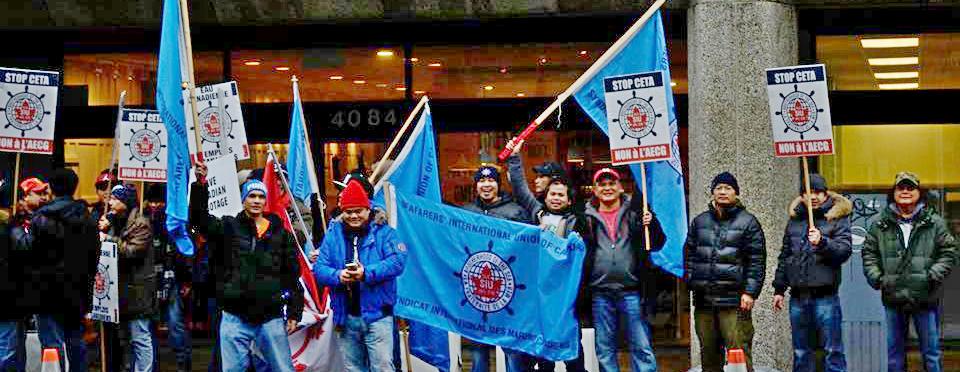
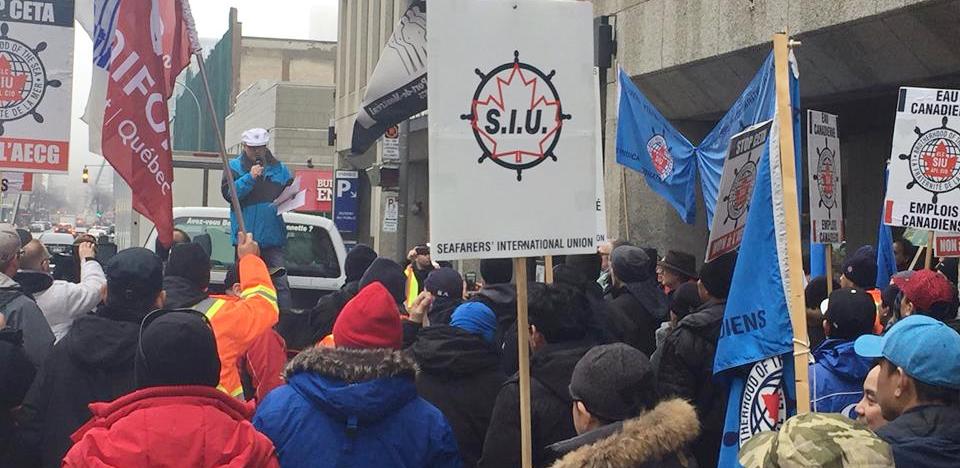
Toronto

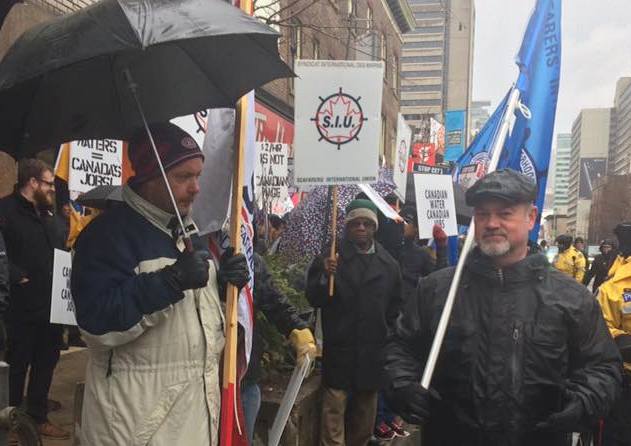
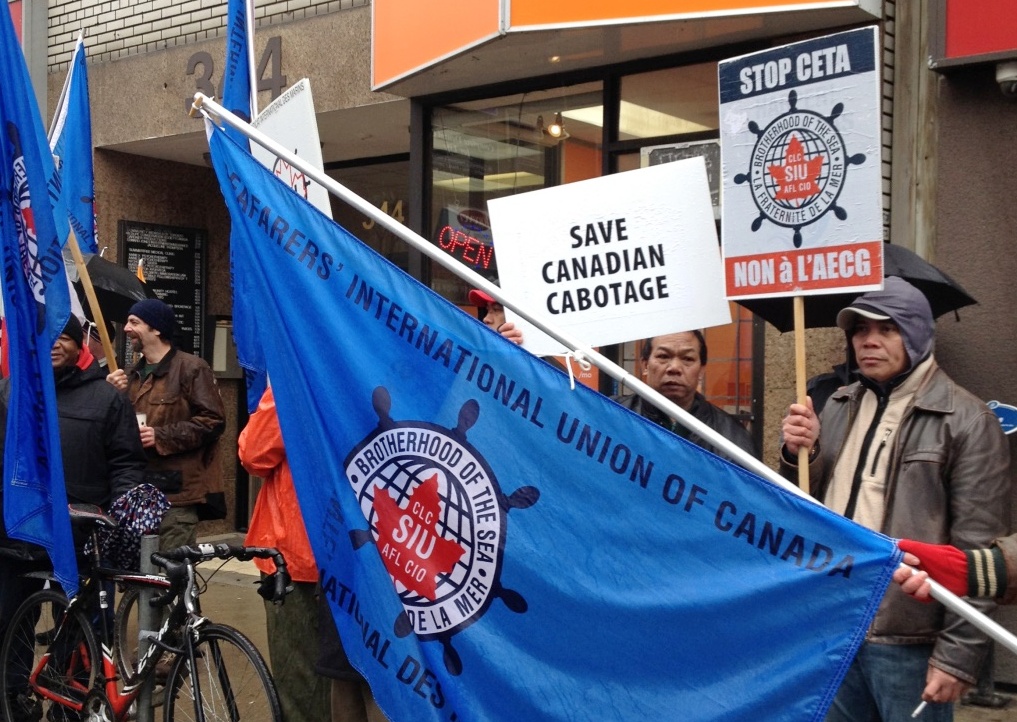
Vancouver
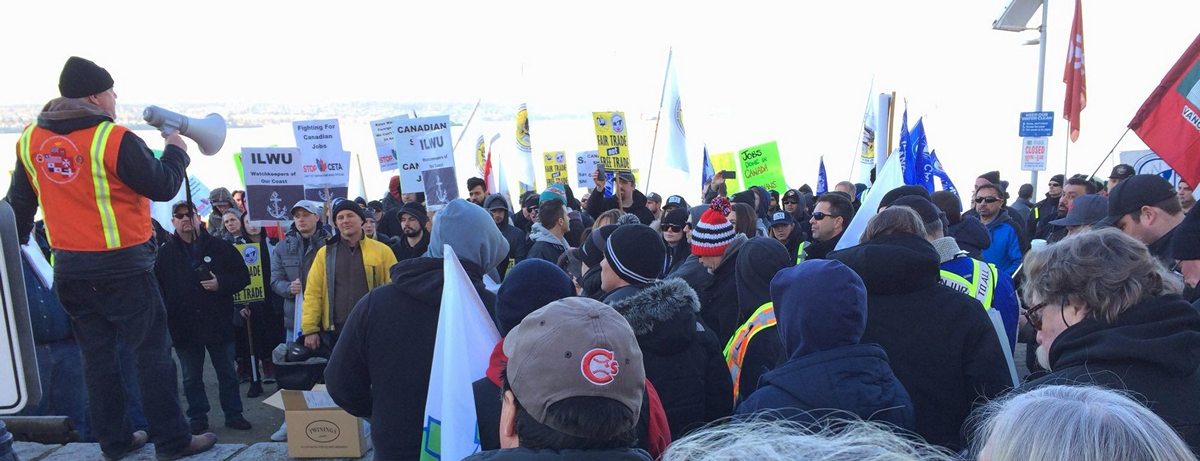
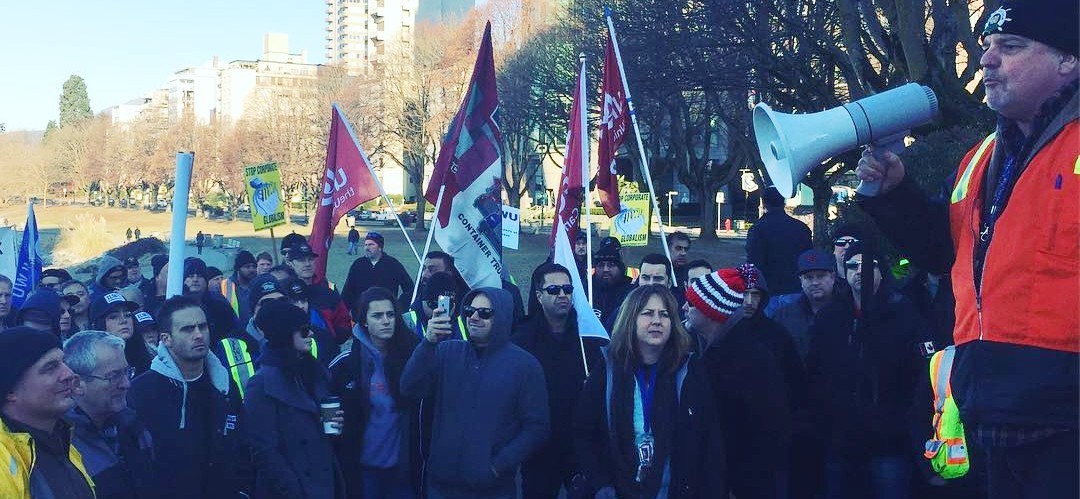
Victoria
